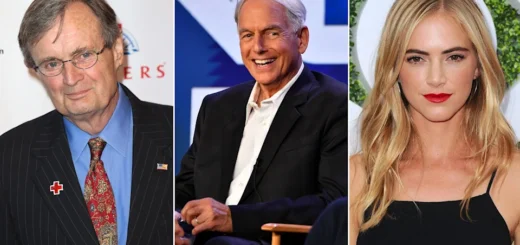Crockett’s remarks, which he made while discussing immigration and labor, were seen to be problematic by a significant number of listeners, which led to the beginning of the issue. The comments centered on the subject of why Americans were not taking up work in the agricultural sector, particularly in farming, which is primarily dependent on the labor of immigrants. A sarcastic tone was used by Crockett when he made the following remark: “Ain’t none of you trying to go and farm right now,” followed by the statement, “We done picking cotton.” Crockett was making a parallel between the refusal of African Americans to engage in hard physical work in today’s economy and the forced labor of enslaved folks during the time of the Civil War. The obvious conclusion was that Crockett was making this comparison.
George ‘Tyrus’ Murdoch, a superstar in the entertainment industry, began his journey to success at the University of Nebraska – Kearney Athletics.
The fact that Crockett used slavery as a point of comparison hit a chord, despite the fact that her aim may have been to remark on the subject of immigration and the work that many immigrants take up in the agricultural sector. Many persons in attendance became visibly surprised when they heard the phrase “picking cotton,” which was a blatant allusion to the terrible work that was performed by enslaved African Americans in the United States. The response of the audience, which was marked by uncomfortable laughing, further added to the intensity of the occasion, highlighting the discomfort that these individuals who were there were experiencing.
The video of Crockett’s remarks soon gained extensive attention and became viral, spreading across various social media platforms and garnering severe outrage. It was pointed out by a number of commenters that making a comparison between the exploitation of enslaved people and contemporary labor difficulties was not only callous but also historically wrong. Crockett is accused of trivializing the suffering of African Americans who were subjected to years of forced labor and dehumanization. Critics believe that Crockett used slavery as a rhetorical technique to make a political point about immigration and labor.
The criticism that has been directed on Crockett’s remarks has been fast and severe. Some people have accused her of employing racially inflammatory terminology in order to win political points, while others have said that her words indicate a lack of comprehension of the terrible past that continues to resonate with a large number of African Americans. The topic has not yet been explicitly addressed by Crockett; nonetheless, the episode has prompted larger worries about the way that the Democratic Party is heading, particularly in light of the fact that it is struggling with problems pertaining to race, immigration, and labor.

Crockett’s comments have highlighted not just her own political future but also the manner in which politicians approach delicate matters such as immigration and race. Crockett is a rising star in the Democratic Party, and her words have brought attention to both of these topics. It is possible that the impact from this episode will have an effect on the course of her career as well as the larger national debate going on about these significant issues. A dispute that is not even close to being resolved has been sparked by Crockett’s effort to address the nexus of immigration and labor. This is something that is still quite evident.
Identity Politics vs. Policy: The Shifting Sands of the Democratic Party
Democratic Party
The comments made by Crockett are not isolated isolated events. These statements are representative of a larger movement within the Democratic Party that is moving toward giving identity politics more weight than real policy answers. Some people believe that many Democratic politicians are more concerned with employing buzzwords and virtue signaling in order to achieve momentum on social media than they are with tackling serious concerns like as crime, border security, and inflation. As a result of this transition, allegations of performative activism have surfaced, which is a style of activism in which the image of caring about social justice is prioritized above the actual implementation of policies that are successful.
Some people believe that the way in which the administration of Vice President Joe Biden handled the situation at the border is an example of this reliance on appearances. The “open door” policies of the government have been criticized for the alarming increase in the number of people entering the country illegally. He has demanded new legislation to handle the issue, but instead of accepting responsibility for the situation, Vice President Biden has deflected it to Congress. The tactic of creating a problem and then portraying oneself as the answer is seen to be manipulative and cynical. It is aimed to appeal to the emotions of people rather than giving true solutions.
There is a crisis of credibility due to the use of selective outrage and double standards.
The manner in which the media has handled Crockett’s statements has brought to light what many people see to be an obvious double standard. It has been pointed out by critics that if conservatives had made sentiments that were comparable to those, they would have been received with instant and widespread criticism. However, the statements made by Crockett have been generally overlooked or discounted by major media sites, which raises issues about the level of prejudice and selective anger that exists in the media.
Crockett’s claim that black Americans “aren’t picking cotton anymore” is racist, according to Jesse Watters, who provided a scathing analysis of the scenario. Watters called Crockett’s viewpoint racist. It is his contention that immigrants often take “good blue-collar jobs” and so drive down wages, especially in regions such as the South Side of Chicago. Watters’ viewpoint questions the conventional wisdom that immigration is a force that is only beneficial to society by putting an emphasis on the implications that immigration policies have in the actual world.
How Does the Left’s Fragmentation Compare to a Party That Is in Disarray?
Crisis at the Border
The issue that has arisen as a result of Crockett’s remarks comes at a time when the Democratic Party is experiencing a rising sense of divide. A variety of groups within the party are competing for attention and influence, as seen by the long speeches delivered by Cory Booker, Bernie Sanders, and Alexandria Ocasio-Cortez’s “political rock band” tour. The party’s future has been called into doubt as a result of this lack of cohesiveness, which, when paired with a perceived distance from the concerns of common people, has led to the situation.
One of the most apparent instances of this fragmentation is the significant discrepancy between the party’s response to critiques from inside its members and criticisms from that which comes from outside its ranks. When Hillary Clinton questioned the results of the 2016 election, she was praised for her bravery. Similarly, Stacey Abrams was celebrated as a fighter for refusing to concede in Georgia. However, when conservatives raise concerns about election integrity, they are immediately labeled as threats to democracy. This inconsistency has fueled accusations of hypocrisy and further eroded trust in the Democratic Party.
The Jasmine Crockett situation presents a crucial moment for the Democratic Party. Will they address the concerns raised by her comments and take steps to bridge the growing divide within their ranks? Or will they continue to prioritize identity politics and ignore the needs of ordinary Americans? The answer to this question will likely determine the future of the party and its ability to remain relevant in an increasingly polarized political landscape.
Ultimately, the controversy surrounding Crockett serves as a potent reminder of the challenges facing the Democratic Party. To regain the trust of voters and remain competitive, the party must move beyond divisive rhetoric and focus on developing concrete policies that address the real-world concerns of all Americans.



